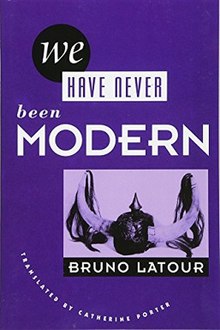We Have Never Been Modern
 | |
| Author | Bruno Latour |
|---|---|
| Original title | Nous n'avons jamais été modernes: Essai d'anthropologie symétrique |
| Translator | Catherine Porter |
| Country | France, United States |
| Language | English |
| Subjects | Science and technology studies, philosophy of science |
| Published |
|
| Pages | 157 |
LC Class | Q175.5.L3513 1993 |
| Preceded by | Science in Action |
| Followed by | Aramis, or the Love of Technology |
We Have Never Been Modern is a 1991 book by Bruno Latour, originally published in French as Nous n'avons jamais été modernes: Essai d'anthropologie symétrique (English translation: 1993).[1]
Content
The book is an "anthropology of science" that explores the dualistic distinction
"Latour speaks of modern and non-modern constitutions, each with four “guarantees”. There is also an implicit notion of a pre-modern constitution as well, though its less codified conventions would not amount to guarantees. Each of his constitutions addresses four, so to speak, ontological realms: the subject, the object, language and being. The realm of the subject is also that of society, communities, culture and the state; the realm of the object is that of things, technologies, facts and nature; the realm of language includes practices of discourse, mediation, translation, delegation and representation; and, finally, the realm of being includes God and the gods, the immortals, the totemized ancestors – it includes questions of existence. For Latour every epoch’s constitution must have conventions and guarantees in these four ontological realms. The four guarantees of the modern constitution for Latour are: (a) that nature (i.e. things, objects) is “transcendent”, or universal in time and space; there to be discovered; (b) that society (the subject, the state) is “immanent”, i.e. it is continually constructed “artificially” by citizens or by subjects; (c) that “translation networks” between these first two realms are “banned”, i.e. the “separation of powers” of these realms is “assured”; (d) that a “crossed out God” acts as “arbitrator” of this dualism."[4]
On economics
| Part of a series on |
| Critique of political economy |
|---|
Latour challenges the traditional understanding of the economy as a purely objective, quantitative, and value-free science in the book. He believes that this view fails to consider the relationships between humans and nonhumans, and argues that traditional economic measures value solely in terms of economic growth and productivity, ignoring the increasing social and ecological costs of these activities, such as environmental degradation, social inequality, and cultural loss. For example by mentioning the challenges that the separation of nature and society that has been present in economic thought poses. Latour uses various examples to critique the modern economics and suggests that economic activity is a complex, interdependent relationship between humans and nonhumans that must take into account social, cultural, and ecological factors. Latour instead argues that a more holistic and integrated approach is necessary for a sustainable and diverse society.
Influence and misrepresentation
Speculative realist Graham Harman points out that Latour has been misrepresented by some as a postmodernist. Harman cites We Have Never Been Modern as crucial to understanding Latour's conceptualisation of the "postmoderns as moderns a minus sign added" and therefore dismisses accusations of Latour as a postmodernist. Harman goes on to be influenced by We Have Never Been Modern adding that postmodernism continues to be subject-centric/anthropocentric (as modernity did) in its distinction of the subject from the object. This forms the basis for Harman's object-oriented ontology.[5]
See also
- Gilbert Durand's anthropological trajectory
- Science in Action
- Politics of Nature
- Laboratory Life (With Steve Woolgar)
- André Gorz
References
- ISBN 978-0-674-94839-6.
- ISBN 978-0-674-94839-6.
- S2CID 142859856. Retrieved 2010-08-10.
- ^ "Objects that Judge: Latour's Parliament of Things". transversal texts. Retrieved 2021-11-29.
- OCLC 1019643398.
Latour, Bruno. 1993. We Have Never Been Modern. Cambridge, Mass: Harvard University Press. p.50,54,66,101,
